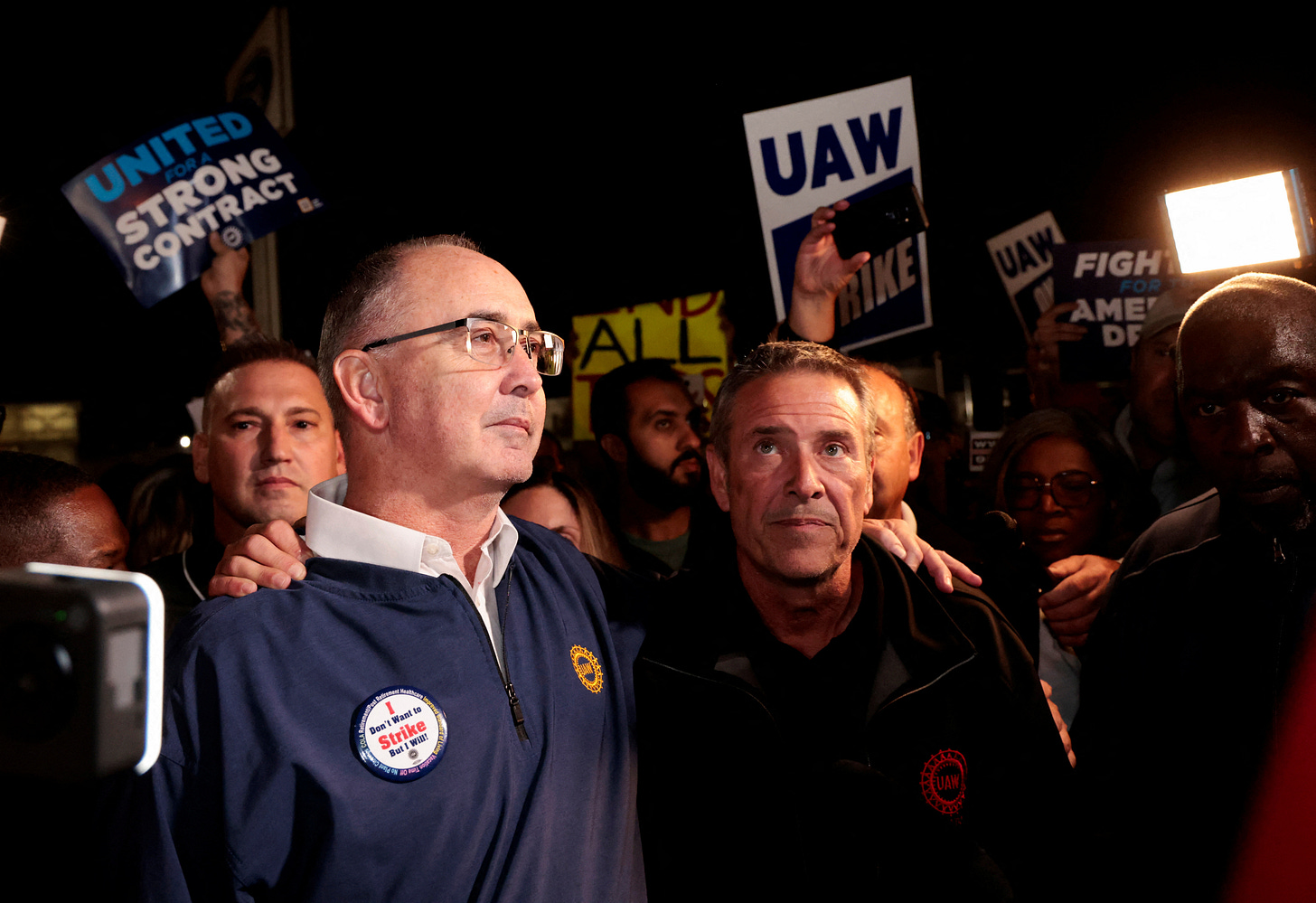UAW Launches Largest Organizing Drive in Modern American History
The United Auto Workers launched simultaneous organizing campaigns at more than a dozen non-union automakers today, building on recent wins at GM, Stellantis, and Ford.
By Katie Nixdorf, More Perfect Union
The United Auto Workers (UAW) announced Wednesday that it has embarked on an unprecedented campaign to organize roughly 150,000 workers at 13 non-union automakers. Included in the campaign are the German Three of Volkswagen, Mercedes, and BMW; the Japanese & Korean Six of Toyota, Honda, Nissan, Hyundai, Subaru, and Mazda; and American electric vehicle manufacturers Tesla, Rivian, and Lucid.
On a newly launched website, the union points to skyrocketing profits at these companies and the pay gap between CEOs and workers. Tesla CEO Elon Musk’s $230 billion net worth and Mercedes’ $1.9 billion in stock buybacks in the last eight months are cited as reasons for workers to “Stand Up and fight for more.” It echoes the strategy used in the latest contract campaign at Big Three, which resonated widely with workers, political leaders, and the public.
It’s been no secret that the UAW's next step after a historic victory at the Big Three was going to be a widespread organizing drive across the sector. “One of our biggest goals coming out of this historic contract victory is to organize like we've never organized before,” UAW President Shawn Fain said in an October video after reaching an agreement with Ford. “When we return to the bargaining table in 2028, it won't just be with the Big Three, but with the Big Five or Big Six.”

Since then, many non-union automakers—which have concentrated their U.S. manufacturing in right-to-work states, where organizing is more difficult—have offered raises in line with what the UAW won for its members. Hyundai says it will give workers the same 25 percent raises UAW members will receive over the next four-and-a-half years. Honda is matching the 11 percent raises UAW will get in the first year of the new contract, while Nissan opted for 10 percent raises and Toyota for 9 to 10 percent.
The UAW is betting that raises won’t be enough to dissuade an organizing drive, especially one that spans the entire sector. Thousands of workers have already signed union authorization cards, signaling they’d like to join the union, according to the UAW.
“Since we began our Stand Up Strike, the response from autoworkers at non-union companies has been overwhelming,” said Fain in a new video about the organizing campaign. “Workers across the country, from the West to the Midwest and especially in the South, are reaching out to join our movement and to join the UAW.”
Organizing these plants will be no small task. The UAW suffered high-profile losses in 2014 and 2019 at Volkswagen in Tennessee and in 2017 at Nissan in Mississippi, continuing the long history of organized labor’s struggle to break through in the South.
But the tide could be shifting. “We saw what the UAW members won and it started us thinking that we as workers are worth a lot more than our company currently values us at,” Isaac Meadows, a Volkswagen worker in Tennessee, said in a statement released by UAW.
One of the first campaigns to go public could be at Toyota’s Georgetown assembly complex in Kentucky—now a right-to-work state, but one that has a long tradition of organized labor and a governor who vocally supported the UAW strike. Roughly 8,000 workers there make the company’s Camry, RAV 4, and Lexus ES.
“We’ve lost so much since I started here, and the raise won’t make up for that,” Jeff Allen, a worker at the plant, said in a statement released by UAW. “A union contract is the only way to win what’s fair.”

Thanks for sharing this great news! I'm so impressed with UAW and Shawn Fain.
It’s a really bells-are-tolling story. Wonderful to see so many workers quoted too.
But why call the non-union states as right-to-work states? Everyone has a right to work and in every state people have a right to work. Why not just call the states that bar or discourage auto workers unions as just that?